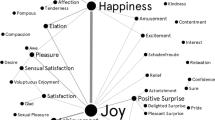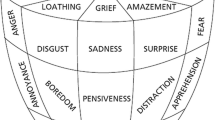Abstract
The purpose of this study was to compare vocal and written expression of feeling about interpersonal traumatic and trivial events in 20-min sessions over a 4-day period. Similar emotional processing was produced by vocal and written expression of feeling about traumatic events. The painfulness of the topic decreased steadily over the 4 days. At the end, both groups felt better about their topics and themselves and also reported positive cognitive changes. A content analysis of the sessions suggested greater overt expression of emotion and related changes in the vocal condition. Finally, there was an upsurge in negative emotion after each session of either vocal or written expression. These results suggest that previous findings that psychotherapy ameliorated this negative mood upsurge could not be attributed to the vocal character of psychotherapy.
Similar content being viewed by others
References
Bady, S. L. (1985). The voice as a curative factor in psychotherapy.The Psychoanal. Rev. 72: 479–490.
Carver, C. S., and Scheier, M. F. (1981).Attention and Self-Regulation: A Control-Theory Approach to Human Behavior, Springer-Verlag, New York.
Daldrup, R. J., Beutler, L. E., Engle, D., and Greenberg, L. S. (1988).Focused Expressive Psychotherapy, Guilford, New York.
deVries, B., Birren, J. E., and Deutchman, D. E. (1990). Adult development through guided autobiography: The family context.Fam. Rel. 39: 3–7.
Donnelly, D. A. and Murray, E. J. (1991). Emotional changes in written essays and therapy interviews.J. Soc. Clin. Psychol. 10: 334–350.
Greenberg, L. S., and Safran, J. D. (1987).Emotion in Psychotherapy, Guilford, New York.
Greenberg, L. S., and Webster, M. C. (1982). Resolving decisional conflict by Gestalt two-chair dialogue: Relating process to outcome.J. Counsel Psychol. 29: 408–422.
Izard, C. E. (1990). Facial expressions and the regulation of emotions.J. Per. Soc. Psychol. 58: 487–498.
L'Abate, L. (1991). The use of writing in psychotherapy.Am. J. Psychother. 45: 87–98.
Matsumoto, D. (1987). The role of facial response in the experience of emotion: More methodological problems and a meta-analysis.J. Per. Soc. Psychol. 52: 769–774.
Murray, E. J., Lamnin, A. D., and Carver, C. S. (1989). Emotional expression in written essays and psychotherapy.J. Soc. Clin. Psychol. 8: 414–429.
Murray, E. J. (1985). Coping and anger. In Field, T. M., McCabe, P. M., and Schneiderman, N. (eds.),Stress and Coping, Erlbaum, Hillsdale, NJ, pp. 243–261.
Nichols, M. P., and Efran, J. S. (1985). Catharsis in psychotherapy: A new perspective.Psychotherapy 22: 46–58.
Nichols, M. P., and Zax, M. (1977).Catharsis in Psychotherapy, Gardner, New York.
Nowlis, V. (1965). Research with the Mood Adjective Check List. In Tomkins, S., and Izard, C. (eds.),Affect, Cognition and Personality, Springer, New York.
Pennebaker, J. W. (1985). Traumatic experience and psychosomatic disease: Exploring the roles of behavior inhibition, obsession, and confiding,Can. Psychol. 26: 82–95.
Pennebaker, J. W., and Beall, S. K. (1986). Confronting a traumatic event: Toward an understanding of inhibition and disease.J. Abn. Psychol. 95: 274–281.
Pennebaker, J. W., Hughes, C. F., and O'Heeron, R. C. (1987). The psychophysiology of confession: Linking inhibitory and psychosomatic processes.J. Per. Soc. Psychol. 52: 781–793.
Pennebaker, J. W., Colder, M., and Sharp, L. K. (1990). Accelerating the coping process.J. Per. Soc. Psychol. 58: 528–537.
Pennebaker, J. W., Kiecolt-Glaser, J., and Glaser, R. (1988). Disclosure of traumas and immune function: Health implications for psychotherapy.J. Consult. Clin. Psychol. 56: 239–245.
Phillips, E. L., and Wiener, D. N. (1966).Short Term Psychotherapy and Structured Behavior Change, McGraw-Hill, New York.
Rachman, S. (1980). Emotional processing.Beh. Res. Ther. 18: 51–60.
Rice, L. N., and Wagstaff, A. K. (1967). Client voice quality and expressive styles as indexes of productive psychotherapy.J. Consult. Psychol. 31: 557–563.
Riskind, J. H., and Gotay, C. C. (1982). Physical posture: Could it have regulatory or feedback effects on motivation and emotion?Mot. Emot. 6: 273–298.
Rutledge, L. L., and Hupka, R. B. (1985). The facial feedback hypothesis: Methodological concerns and new supporting evidence.Mot. Emot. 9: 219–240.
Scherer, K. R. (1986). Vocal affect expression: A review and a model for future research.Psychol. Bull. 99: 143–165.
Winer, D. L., Bonner, T. O., Blaney, P. H., and Murray, E. J. (1981). Depression and social attraction.Mot. Emot. 5: 153–166.
Author information
Authors and Affiliations
About this article
Cite this article
Murray, E.J., Segal, D.L. Emotional processing in vocal and written expression of feelings about traumatic experiences. J Trauma Stress 7, 391–405 (1994). https://doi.org/10.1007/BF02102784
Issue Date:
DOI: https://doi.org/10.1007/BF02102784




